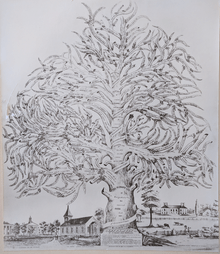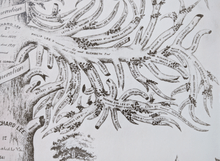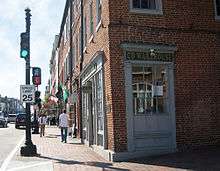Thomas Sim Lee
Thomas Sim Lee (October 29, 1745 – November 9, 1819) was an American planter and statesman of Frederick County, Maryland. Although not a signatory to the Declaration of Independence, the Articles of Confederation or the US Constitution, he was an important participant in the process of their creation. Thomas Sim Lee was the second State Governor of Maryland, serving twice, from 1779 to 1783 and again from 1792 to 1794. Thomas Sim Lee also served as a delegate of Maryland in the Congress of the Confederation in 1783 and was a member of the House of Delegates in 1787. He worked closely with many of the Founding fathers and himself played an important part in the birth of his state and the nation.

Thomas Sim Lee | |
|---|---|
| Governor of Maryland | |
| In office November 12, 1779 – November 22, 1782 | |
| Preceded by | Thomas Johnson |
| Succeeded by | William Paca |
| In office April 5, 1792 – November 14, 1794 | |
| Preceded by | James Brice |
| Succeeded by | John H. Stone |
| Personal details | |
| Born | October 29, 1745 Upper Marlboro, Province of Maryland, British America |
| Died | November 9, 1819 (aged 74) Frederick County, Maryland, U.S. |
| Political party | Federalist |
| Spouse(s) | Mary Digges |
Family
Lee was born in 1745 in Upper Marlboro in the Province of Maryland. He was the son of Thomas (died 1749) and Christiana (Sim) Lee, a grandson of Philip Lee, and descended from the "Blenheim" Line of the Lee family of Virginia. Richard Lee I was his great-great-grandfather. His education was attained in the private schools of his native colony. On October 27, 1771, Thomas Sim Lee married Mary Digges (1745–1805), whose father was a prominent Maryland landowner. They had eight children;

- Ignatius Lee (born 1772)
- Thomas Lee (1774–1826)
- William Lee (1775–1845)
- Eliza Lee (born c. 1777)
- Archibald Lee (1778–1781)
- Archibald Lee (1781–1839)
- Mary Christian Lee (born c. 1783)
- Elizabeth Digges Lee (1783–1862) – married Outerbridge Horsey in 1812.[1]
- John Lee (1788–1871)
Public life
During the Revolutionary War, he backed the patriot cause, and organized a local militia in which he served as colonel. Lee entered politics in 1777, serving as a member of the Maryland Legislature, a position he held two years. The Maryland Legislature elected Lee governor in 1779. He was reelected in 1780 and 1781. During his first tenure, issues regarding the war effort were dealt with. He won wide praise for his logistical abilities as governor. Lee consistently procured fresh troops and supplies for the Continental Army. George Washington was Lee's friend, and learning of the plan to pin down Cornwallis, Lee exerted all his energies to support the American troops. After completing his term, Lee left office on November 22, 1782. He then served in the Continental Congress in 1783 and 1784, and was a member of the State convention that ratified the U.S. Constitution in 1788. In 1792, Lee was again elected governor of Maryland. He was reelected to a second term in 1793, and to a third term in 1794. During his final tenure, the state militia was established, and the Whiskey rebellion was suppressed. Lee left office on November 14, 1794. Later that same year, he declined a seat in the U.S. Senate. He also declined a third tenure as governor in 1798.
Leader in the struggle for independence
Thomas Sim Lee was one of the participants of the Annapolis Convention in the mid-1770s, which produced a constitution for Maryland and transformed the colony into a state. On July 26, 1775 he was one of the signatories of the Declaration of the Association of the Freemen of Maryland, an influential statement in the Revolutionary War.
Articles of Confederation and Perpetual Union
As Governor of Maryland, Thomas Sim Lee signed the Act on February 2, 1781, whereby the Maryland Legislature ratified the Articles of Confederation and Perpetual Union. As Maryland was the 13th and final state to ratify the Articles, the act established the requisite unanimous consent for the formation of a Perpetual Union of the states.
Prior to this event, Maryland had held out and refused to ratify the Articles until every state had ceded its western land claims. After Governor Thomas Jefferson signed the Act of the Virginia legislature on January 2, 1781 to grant these concessions the way forward for Maryland was cleared. On this second day of February, a Friday, as the last piece of business during the afternoon Session, "among engrossed Bills" was "signed and sealed by the Governor, in the Senate Chamber, in the presence of the members of both Houses...an Act to empower the delegates of this state in Congress to subscribe and ratify the articles of confederation." The Senate then adjourned "to the first Monday in August next". The formal signing of the Articles by the Maryland delegates took place in Philadelphia at noon time on March 1, 1781. With these events, the Articles entered into force and the United States came into being as a united and sovereign nation.
Member of the Congress of the Confederation
In his post-governor career, Thomas Sim Lee represented Maryland as a delegate to the Continental Congress in 1783 and 1784. He also was a member of the house of delegates in 1787. He declined the opportunity to serve in the convention that drafted the Constitution of the United States, but served in the state convention that ratified the Constitution in 1788. Lee voted for Washington's second term as a Federalist presidential elector.
The contribution of his wife
Governor Lee's wife, Mary Digges Lee, responded to the need of the Revolutionary War troops from Maryland by rallying the women of Maryland to raise money in support of the war effort. She then established a correspondence with General George Washington, asking how these resources could be put to best use. General Washington responded suggesting that the money raised be put toward the purchase of much-needed shirts and black neck clothes for the troops in the Southern army. He expressed gratitude to Mrs. Lee for the "patriotic exertions of the ladies of Maryland in favor of the army". [2]
The couple was very active in patriotic activities during the Revolutionary War. They were also very committed to their religious and community ties. They founded the St. Mary's Roman Catholic Church in Petersville, Maryland.
Needwood and Georgetown
After retiring from political life in 1794, Governor Lee focused his attention on his estate, Needwood, in Frederick County, Maryland, where he owned some two hundred slaves.
Lee set up a winter home in Georgetown, near the nation's capital. Federalists frequented the home, which became a meeting place for them.
Thomas Sim Lee was on the Board of directors of the Patowmack Canal, which was intended by George Washington to connect the Tidewater near Georgetown with Cumberland. The project, which started in 1785, was completed in 1802.
Death
Mary Digges Lee died on January 25, 1805 at the age of 60. Thomas Sim Lee remained a widower in Needwood until his death on November 9, 1819 at the age of 74 years. He was first buried at Melwood Park, his wife's family home. In 1888 his and the Melwood Diggeses' graves were moved to a common grave in Mt. Carmel Roman Catholic Cemetery near Upper Marlboro, Maryland.[3]
Tribute
A bronze plaque commemorating his life has been placed on a house he built in 1790 on 3001–3009 M Street (on the corner of M Street and 30th Street) in the Georgetown section of Washington D.C.. The site is now referred to as the Thomas Sim Lee Corner.

Notes
- "Elizabeth Digges Horsey, MSA SC 3520-14927". Retrieved August 1, 2016.
- "Mary Digges Lee, Maryland Women's Hall of Fame". Retrieved August 1, 2016.
- "Thomas Sim Lee, MSA SC 3520-0800". Retrieved August 1, 2016.
References
- "Dictionary of American Biography." Vol. 11, New York: Scribner's, 1933, p. 132.
- Sobel, Robert, and John Raimo, eds. "Biographical Directory of the Governors of the United States, 1789–1978, Vol. 2," Westport, Conn.; Meckler Books, 1978. 4 vols.
External links
- United States Congress. "Thomas Sim Lee (id: L000206)". Biographical Directory of the United States Congress.
| Political offices | ||
|---|---|---|
| Preceded by Thomas Johnson |
Governor of Maryland 1779–1782 |
Succeeded by William Paca |
| Preceded by James Brice Acting Governor |
Governor of Maryland 1792–1794 |
Succeeded by John Hoskins Stone |